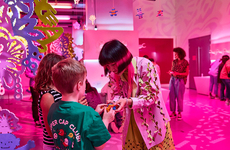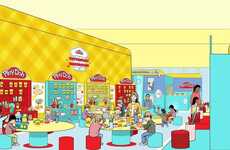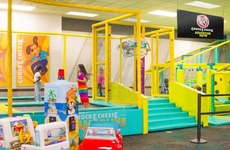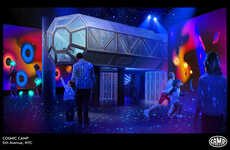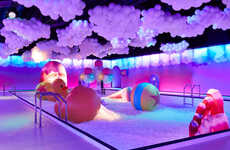
The Adult-Experience Theme Park for Kids
Surely this is a new form of child abuse.
Tokyo has unveiled the newest trend in branded entertainment: a themepark called Kidzania where adults pay $30 to let their kids "work" in various simulated job environments. According to their website, Kidzania.com, additional locations are either in development or operational in Jakarta, Mexico City, and Monterrey.
Although at first glance this may appear to be a child's worst nightmare, multinational corporations are clamouring to get in on the newest form of branded engagement. Through Kidzania, children are now able to "work" at Coca-Cola, Mo's Gourmet Hamburgers, a Johnson & Johnson hospital ward, and Mistubishi Auto World. The website for the Mexico City park references additional "jobs" in the service, residential, cultural, industrial, media, restaraunt, retail, and transportation fields. Working children earn "Kidzos" which can be spent on prizes or "leisure activities" such as garment making, chocolate making, or magic lessons. And of course, true to the real-world theme, you can also open a Kidzo savings account and accumulate interest, drawing from various ATMs around the park.
Before I begin my rant, I just want to point out that this is a fantastic idea. These experiences are instilling work ethic, financial management, and career exploration at a young age. It's like "playing house" times a million. Years down the line these nations are going to benefit from a more responsible, well rounded, young adults entering the professional work force. And these brands are getting great exposure to both children and parents, offering them are look at the equity-building activities going on behind the scenes. Kidzania also deserves props for figuring out a business model that encourages kids to not spend their rewards all at once, but rather come back (pay another $30), and spend them another day. But that's when the kid in me pipes up and says "MAN, that's a crappy amusement park!" "What's that? Oh no thanks Dad. I don't want to go eat sugary foods and ride roller coasters. I'd rather pretend to be a line cook at a burger joint or have an adult supervise me in a cherry picker while I pretend to remove an imaginary cat from a cardboard tree. That will be much more fun." I say let kids be kids and let them suffer the misery of adulthood in their due time. And although the corporate partners involved in these parks have made a wise brand investment, it's surely not right for every organization. I can't expect to see the "Nike Factory" stop on the tour popping up anytime soon.
Bobby's Prediction: Educational Field Trip 2.0: Trips to the science center will become a thing of the past, but don't expect it to replace Disney World any time soon.
Tokyo has unveiled the newest trend in branded entertainment: a themepark called Kidzania where adults pay $30 to let their kids "work" in various simulated job environments. According to their website, Kidzania.com, additional locations are either in development or operational in Jakarta, Mexico City, and Monterrey.
Although at first glance this may appear to be a child's worst nightmare, multinational corporations are clamouring to get in on the newest form of branded engagement. Through Kidzania, children are now able to "work" at Coca-Cola, Mo's Gourmet Hamburgers, a Johnson & Johnson hospital ward, and Mistubishi Auto World. The website for the Mexico City park references additional "jobs" in the service, residential, cultural, industrial, media, restaraunt, retail, and transportation fields. Working children earn "Kidzos" which can be spent on prizes or "leisure activities" such as garment making, chocolate making, or magic lessons. And of course, true to the real-world theme, you can also open a Kidzo savings account and accumulate interest, drawing from various ATMs around the park.
Before I begin my rant, I just want to point out that this is a fantastic idea. These experiences are instilling work ethic, financial management, and career exploration at a young age. It's like "playing house" times a million. Years down the line these nations are going to benefit from a more responsible, well rounded, young adults entering the professional work force. And these brands are getting great exposure to both children and parents, offering them are look at the equity-building activities going on behind the scenes. Kidzania also deserves props for figuring out a business model that encourages kids to not spend their rewards all at once, but rather come back (pay another $30), and spend them another day. But that's when the kid in me pipes up and says "MAN, that's a crappy amusement park!" "What's that? Oh no thanks Dad. I don't want to go eat sugary foods and ride roller coasters. I'd rather pretend to be a line cook at a burger joint or have an adult supervise me in a cherry picker while I pretend to remove an imaginary cat from a cardboard tree. That will be much more fun." I say let kids be kids and let them suffer the misery of adulthood in their due time. And although the corporate partners involved in these parks have made a wise brand investment, it's surely not right for every organization. I can't expect to see the "Nike Factory" stop on the tour popping up anytime soon.
Bobby's Prediction: Educational Field Trip 2.0: Trips to the science center will become a thing of the past, but don't expect it to replace Disney World any time soon.
Trend Themes
1. Branded Experience Entertainment - Industries can provide immersive experiences to customers that reinforce brand values and enable interactions across their product lines.
2. Immersive Educational Environments - Educational and entertainment industries can combine forces to offer more experiential and interactive learning opportunities.
3. Child-focused Augmented Reality - Industries can focus on developing an augmented reality game or experience that allows children to play and learn about various industries in a fun and engaging manner.
Industry Implications
1. Entertainment - Entertainment companies can create experiential branded environments that allow customers to interact with their products and services in a more engaging way.
2. Education - Education companies can develop immersive environments that allow students to have experiential learning opportunities that go beyond textbooks and classrooms.
3. Technology - Technology companies can develop child-focused augmented reality games and experiences that allow children to learn and play in interactive and engaging ways.
6.1
Score
Popularity
Activity
Freshness

